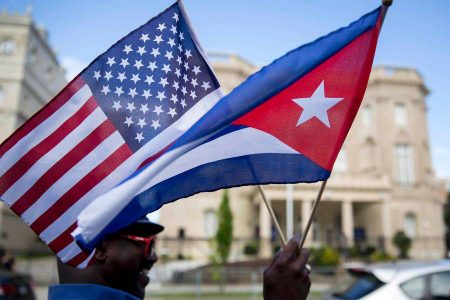
Cuba does not cooperate in fight against terrorism and promotes disinformation
The Trump administration has included Cuba on its list of countries that do not cooperate with the United States in the fight against terrorism, and accused the island’s government of promoting disinformation in the region.
The State Department notified Congress on Tuesday that it had “certified” that Cuba, Venezuela, Iran, North Korea and Syria did not cooperate “fully” with U.S. counterterrorism efforts in 2019.
The certification, which is issued annually under a requirement in the Arms Export Control Act, entails restrictions on the sale of weapons and defensive items to these countries but does not convey the broad financial constraints that fall on states deemed by the U.S. government as “sponsors of terrorism.”
Cuba was removed from both lists in 2015, when President Barack Obama restored diplomatic relations with Cuba.
For the “not fully” cooperating determination, the State Department undertakes “a review of a country’s overall level of cooperation in our efforts to fight terrorism, taking into account our counterterrorism objectives with that country and a realistic assessment of its capabilities,” an agency spokesperson told the Miami Herald.
To explain its decision to include Cuba, the State Department cited the Cuban government’s refusal to extradite members of the National Liberation Army, or ELN, to Colombia. The ELN claimed responsibility for a terrorist attack on a police academy in Bogotá in 2019, in which 22 people died.
The Cuban government refused the extradition request, citing the peace protocols signed between members of the Colombian government and the guerrillas.
“Cuba’s refusal to productively engage with the Colombian government demonstrates that it is not cooperating with U.S. work to support Colombia’s efforts to secure a just and lasting peace, security, and opportunity for its people,” the statement said.
The State Department also said that the Cuban government gives refuge to people who have escaped from U.S. justice. In particular, the agency cited the case of Joanne Chesimard, who was found guilty of murdering a New Jersey police officer in 1973.
The inclusion of Cuba on the list on Tuesday happened the same day that Cuban Foreign Minister Bruno Rodríguez accused the Trump administration of promoting terrorism against the island. The minister said the “aggressive” U.S. rhetoric encouraged an attack on the Cuban Embassy in Washington by a man with mental health issues.
State Department officials also said Wednesday that Cuba is “a malign actor” participating with Russia, Iran, China and Venezuela in “concerted efforts” to promote disinformation and spread propaganda in Latin America amid the coronavirus pandemic.
Lea Gabrielle, the coordinator of the State Department’s Global Engagement Center, said in a call with reporters that the Cuban government was trying to take advantage of the crisis caused by the new virus to “amplify” propaganda about its medical missions.
The missions have been criticized because the island’s government keeps most of the doctors’ salaries, according to testimonies and official documents. But during a global pandemic, the Cuban government has managed to send more than 1,500 doctors, nurses and technicians at the request of more than 20 countries.
“The Cuban propaganda machine has a global reach in social media,” Gabrielle said. “We have identified more than four dozen Twitter accounts that are key components of that global network, including accounts in Venezuela, alongside other countries in the region, and even as far as Africa, the Middle East and Europe.
“These accounts have worked together to try to obscure the role of the government in the exploitation inherent to the Cuban medical program,” she added.
Accounts associated with the government’s medical missions, its embassies, and so-called “solidarity groups with Cuba” in various countries frequently amplify on social media propaganda produced by Cuban state outlets.
In recent months, Twitter has suspended accounts of Cuban official media outlets and political organizations, most recently of the Young Communist League.
Source: Stripes





